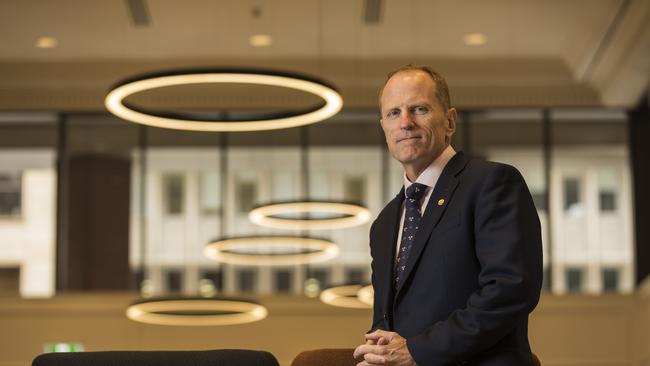Back off our royalties, resources sector tells Annastacia Palaszczuk
The oil and gas lobby fears governments will use the industry as a ‘cash cow’ by increasing royalties to pay for ballooning state debt.

The oil and gas lobby fears cash-strapped governments will use the industry as a “cash cow” by increasing royalties to pay for ballooning state debt created by the pandemic.
The Australian Petroleum Production and Exploration Association has urged the Queensland government to rule out future royalty hikes after the October 31 election, saying the industry can better help the state recover from the effects of COVID-19 restrictions if it has the certainty it needs to grow.
APPEA chief executive Andrew McConville said the industry was already battling historically low oil prices and would struggle if royalties were increased.
“Our plea to government and opposition is to resist that temptation,” he said. “The best outcome to help restore the state’s finances and … economy is to actually grow the oil and gas sector.”
In the lead-up to the election, APPEA has called for 20 key reforms it says will make it better placed to spearhead the state’s economic recovery. Mr McConville said the list aimed for “policy clarity and regulatory certainty”.
Included in the pitch is a demand for national cross-border movement for oil and gas industry workers, faster government certification of rehabilitated land, and confirmation that Lake Eyre Basin protections will go no further than the Bligh government’s Wild Rivers protections.
It has also called for duplicated federal and state environment regulations to be refined.
APPEA says the industry has spent more than $50bn in Queensland since 2011 and employs 4600 workers. Thirty per cent of Australia’s liquefied natural gas production comes from Queensland, which is a major supplier to other eastern states.
The Queensland Resources Council has been lobbying the Palaszczuk government to match a Liberal National Party commitment to freeze all resource royalties for 10 years. LNG royalties were increased last year by 25 per cent, to 12.5 per cent.
A new scheme is set to come into effect from October 1, simplifying the way royalties are calculated. Mr McConville said potential investors were still attracted to the state’s resources sector but were “flightier” than usual and could be spooked by any hint of negative changes to fiscal settings.
“That makes overseas investors very nervous,” he said. “Because oil prices are low, capital is scarce and already a bit flighty — we remain concerned that governments see this as an opportunity to come in and take more.”
Mr McConville said the better way for the government to generate royalties from oil and gas was to help grow those industries. “It’s not about where the bar is set, it’s about setting the bar and leaving it there. If we’re clear on that and we know the government is supportive, then the investment will come, the growth will come and we can help lead Queensland out of the hole we’re in.”




To join the conversation, please log in. Don't have an account? Register
Join the conversation, you are commenting as Logout